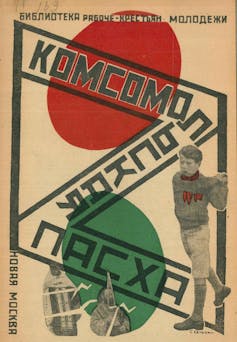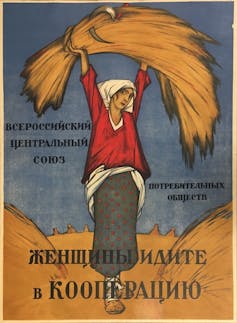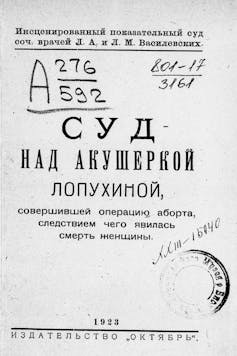Kavanaugh sexual assault hearing evokes early Soviet mock trials
- Written by Erica Stone Drennan, Ph.D. Candidate in Russian Literature, Columbia University
Before last week’s Senate judiciary hearing[1] into sexual assault allegations against Supreme Court nominee Brett Kavanaugh was scheduled, Republican Senator John Cornyn complained that the proceedings would amount to a “show trial[2]” – a public spectacle with a predetermined outcome rather than a serious inquiry into the truth.
Last week’s riveting testimonies by Kavanaugh and his accuser, 51-year-old psychology professor Christine Blasey Ford[3], did at times remind me of early Soviet mock trials[4], the focus of my dissertation research as a scholar of Russian literature and culture[5].
Soviet values
Public mock trials were something of a craze in the decade after the 1917 Russian Revolution[6].
Performed in factories and workers’ clubs, these fictional judicial proceedings were an entertaining way to educate Soviet citizens about their country’s new laws and Communist values.
A 1920 mock trial of the Communist Party leader Vladimir Lenin[7], for example, aired criticisms against Lenin in order to refute them.
 Soviet Russian mock trials were designed to teach moral and legal lessons.
Russian State Library, Author provided (No reuse)
Soviet Russian mock trials were designed to teach moral and legal lessons.
Russian State Library, Author provided (No reuse)
Staged trials of drunkards taught the audience moral lessons about the evils of alcohol. And a 1924 mock trial of the Bible highlighted inconsistencies in this religious text in order to undermine the authority of Christianity.
The fictional trial scripts were published by state-run presses as short pamphlets, with up to 100,000 copies of each circulated. I have reviewed dozens of the copies housed in Moscow’s Lenin Library[8] and the Russian State Archive of Literature and Arts[9].
Though the trials were scripted, actors were encouraged to improvise their lines, and the audience could often participate in the show as jurors.
The verdict, however, was almost always predetermined to reflect the Soviet government’s idealized vision of this new Communist society.
Trying acquaintance rape
One 1925 fictional trial, The Trial of Citizen Fedor Sharov Accused of Spreading Gonorrhea[10], reveals that there’s nothing new about the “he said, she said” aspect present in judging sexual assault allegations[11] – including those lodged against Kavanaugh[12].
Sharov is a fictional 21-year-old factory worker accused of bringing his fellow worker, 19-year-old Anna Nikolaeva, to a private room in a bar, where he gets her drunk and rapes her.
The mock trial focuses on whether Sharov gave Nikolaeva gonorrhea, with the aim of teaching the Soviet public about the spread and treatment of sexually transmitted diseases.
But in the script, the prosecutor also seeks a charge of rape against Sharov, arguing that his sexual assault is also a crime.
Like the accusations against Kavanaugh, which allege that he physically assaulted Ford at a party in high school[13], this mock trial tackles not stranger rape but sexual violence committed by an acquaintance.
Nikolaeva explains that before the rape Sharov had pursued her aggressively. When she rebuffed him, he insisted, saying he wanted “to be more than your comrade” – a statement that demonstrates Sharov’s retrograde attitudes about gender.
In Soviet Russia, women were supposed to be equal to men[14].
Other characters in the mock trial condemn Sharov for harboring “old ideas and views about women,” with one witness even saying the rape allegations don’t surprise him.
Ultimately, the prosecutor uses Sharov’s misogyny to argue for a guilty verdict, declaring that the defendant sees his female co-workers and fellow students not as comrades, but as people “to seduce and ruin.”
Women’s dubious credibility
Even in allegedly gender-equal Soviet Russia, Nikolaeva struggles to convince the men in power that she was raped.
The judge begins the proceedings by asking whether she told anyone about the assault. Like many sexual assault survivors[15], Nikolaeva says she did not.
 In Soviet Russia, women were to be seen as comrades and co-workers — not sexual objects.
Ignite Nivinsky,[16]
In Soviet Russia, women were to be seen as comrades and co-workers — not sexual objects.
Ignite Nivinsky,[16]
“Who was there to tell?” she asks. “I was ashamed.”
The defense attorney proposes that perhaps Sharov raped Nikolaeva because “he really liked” her, equating sexual violence with affection.
Even the prosecutor offends his star witness by asking if she has sexual partners “other than Sharov.”
The trial concludes with a mixed verdict: Sharov is convicted of infecting Nikolaeva with gonorrhea but acquitted for her rape because Nikolaeva willingly accompanied him into the bar.
He said, she said
Other Soviet mock trials on sexual health demonstrate similar disregard for women’s experiences.
In the 1925 Trial of a Prostitute and a Procuress[17], Stepan Klimov accuses the sex worker he visited, Zinaida Evdokimova, of knowingly infecting him with syphilis, which she vigorously denies.
Klimov claims he did not sleep with anyone other than Evdokimova. And as a prostitute she must have known she had syphilis, the prosecution insists.
Evdokimova tearfully explains that she could not have intentionally infected Klimov because she would have sought treatment had she known she was ill.
“No one wants to rot alive,” she says.
As her defense attorney points out, the government’s case is based entirely on assumptions and the victim’s testimony.
Nevertheless, Evdokimova is convicted.
A referendum on abortion
The issues debated in the 1923 Trial of the Midwife Lopukhina Who Performed an Abortion Operation that Resulted in the Death of a Woman[18] also feel modern.
 The 1923 ‘Trial of the Midwife’ debates abortion.
Russian State Library, Author provided (No reuse)
The 1923 ‘Trial of the Midwife’ debates abortion.
Russian State Library, Author provided (No reuse)
Its purpose was to teach the Soviet public about abortion, which had just been legalized[19] in 1920. Russia was the first European country to allow the procedure, but only when performed by a doctor, at his discretion, in a clinical setting.
As each side debates the merits of the midwife’s actions, the trial effectively becomes a referendum on this new woman’s right.
Numerous characters, including the doctor and expert witness, imply that women who have abortions should be ashamed. The judge explains that, before performing the operation, doctors should “take all measures…to dissuade her.”
This may sound familiar[20] to those who follow the abortion debate in the United States.
Has anything changed?
At least some of the social issues troubling early Soviet Russia are still on trial in the United States today.
Modern Western society has long been publicly grappling with how to judge women’s voices, rights and experiences – debates that for over a century have descended into “he said, she said[21],” victim-blaming and shame.
Washington, D.C. today differs from 1920s Soviet Russia in many ways. But when it comes to gender matters, I have found, soberingly and unexpectedly, significant similarities.
References
- ^ Senate judiciary hearing (www.nytimes.com)
- ^ show trial (en.wikipedia.org)
- ^ Christine Blasey Ford (www.npr.org)
- ^ early Soviet mock trials (books.google.com)
- ^ scholar of Russian literature and culture (slavic.columbia.edu)
- ^ Russian Revolution (www.britannica.com)
- ^ Vladimir Lenin (www.bbc.co.uk)
- ^ Lenin Library (www.rsl.ru)
- ^ Russian State Archive of Literature and Arts (www.iisg.nl)
- ^ The Trial of Citizen Fedor Sharov Accused of Spreading Gonorrhea (www.rgali.ru)
- ^ sexual assault allegations (www.rainn.org)
- ^ lodged against Kavanaugh (apnews.com)
- ^ assaulted Ford at a party in high school (thehill.com)
- ^ women were supposed to be equal to men (isreview.org)
- ^ many sexual assault survivors (www.npr.org)
- ^ Ignite Nivinsky, (commons.wikimedia.org)
- ^ Trial of a Prostitute and a Procuress (dlib.rsl.ru)
- ^ Trial of the Midwife Lopukhina Who Performed an Abortion Operation that Resulted in the Death of a Woman (dlib.rsl.ru)
- ^ legalized (en.wikipedia.org)
- ^ familiar (www.nytimes.com)
- ^ he said, she said (content.time.com)
Authors: Erica Stone Drennan, Ph.D. Candidate in Russian Literature, Columbia University
Read more http://theconversation.com/kavanaugh-sexual-assault-hearing-evokes-early-soviet-mock-trials-104028

